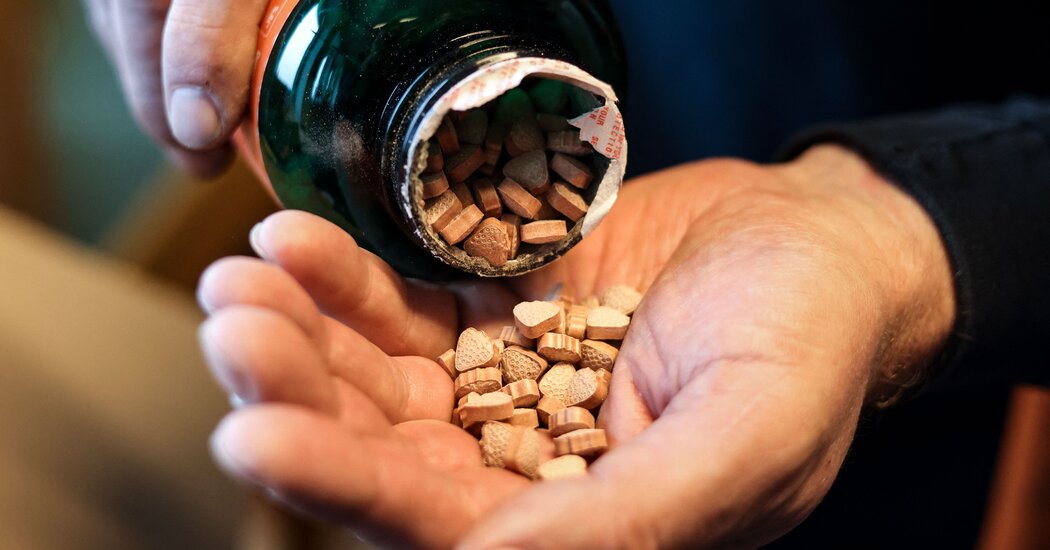
The Food and Drug Administration is considering whether to approve the use of MDMA, also known as Ecstasy, to treat post-traumatic stress disorder. An independent advisory panel of experts reviewed the studies on June 4 and decided not to approve the treatment.
Lykos Therapeutics submitted evidence from clinical trials in an effort to get the agency's approval to legally sell the drug to treat people with a combination of MDMA and talk therapy.
Millions of Americans suffer from PTSD, including military veterans at high risk for suicide. No new treatments for PTSD have been approved in more than 20 years.
What is MDMA?
Methylenedioxymethamphetamine (MDMA) is a synthetic psychoactive drug first developed by Merck in 1912. After being synthesized in the mid-1970s by Alexander Shulgin, a Bay Area psychedelic chemist, MDMA gained popularity among therapists . Early research has suggested significant therapeutic potential for a number of mental health conditions.
MDMA is an entactogen, or empathogen, which promotes self-awareness, feelings of empathy, and social connection. It is not a classic psychedelic like LSD or psilocybin, drugs that can cause altered realities and hallucinations. Among recreational users, MDMA is commonly known as molly or ecstasy.
In 1985, as the drug became a staple at nightclubs and raves, the Drug Enforcement Administration classified MDMA as a Schedule I substance, a drug defined as having no accepted medical use and having a high potential for abuse.
Are there any health risks?
FDA agency staff expressed concern about “significant increases” in blood pressure and heart rate among some of the Lykos clinical trial participants, noting that these were risks that could “trigger cardiovascular events.”
Many industry experts say the drug is generally safe and non-addictive in its pure form.
Adverse reactions associated with MDMA when taken outside of a clinical setting are often caused by adulterants such as methamphetamine and synthetic cathinones, often known as bath salts.
Some recreational users report lower mood in the days after taking MDMA, most likely due to a temporary deficiency of serotonin in the brain, but experts say more research is needed.
What is the framework for approval?
In 2017, the FDA granted “breakthrough” status to MDMA-assisted therapy. Status, a recognition of a drug's therapeutic promise, aims to shorten regulatory timelines.
The original application was sponsored by the nonprofit Multidisciplinary Association for Psychedelic Studies, which earlier this year created a for-profit entity, Lykos Therapeutics, to commercialize MDMA if it gained approval. FDA approval.
The application presents an unusual challenge for the FDA, which typically does not regulate drug treatments associated with talk therapy, an essential part of Lykos' regimen for treating post-traumatic stress disorder.
On June 4, an expert advisory panel reviewed clinical data from Lykos, heard from the public and from staff at the agency, which had published an analysis in late May. The panel rejected the request, citing concerns about efficacy and safety. The agency often follows the commission's suggestions, and a final decision is expected in mid-August.
What do therapeutic sessions involve?
According to a report published in Nature Medicine, about 200 patients in the Lykos clinical trials underwent three sessions, lasting eight hours each, in which about half were given MDMA and the other half a placebo. The sessions were four weeks apart.
Patients also had three appointments to prepare for therapy and another nine where they discussed what they had learned.
The most recent study of the drug found that more than 86 percent of those who received MDMA achieved a measurable reduction in symptom severity. About 71% of participants improved enough to no longer meet the criteria for a PTSD diagnosis.
Any approval by the agency would likely be limited. The drug was studied during sessions assisted by a psychotherapist and, for safety, by a second therapist, given the vulnerability of the patients. The FDA staff's analysis proposed some limitations to the drug's approval, including administration only in certain settings, patient monitoring and monitoring for adverse effects.
But doctors and therapists could still prescribe MDMA off-label, broadening its potential to treat other illnesses like depression or anxiety.
How likely is FDA approval?
Although the two studies supporting Lykos' claim suggest that MDMA therapy has led to significant improvements for PTSD patients, a May 31 FDA staff report highlighted flaws in the study design. In particular, the report noted the high percentage of participants who were able to determine whether they had received MDMA or a placebo, a phenomenon common to many drug studies involving psychoactive compounds.
The Institute for Clinical and Economic Review, a nonprofit that examines the costs and effectiveness of drugs, criticized the studies and described the findings as “inconclusive.”
Overall, the FDA's analysis was largely positive, finding that participants “experienced statistically and clinically significant improvement in PTSD symptoms and that the improvement appears to be lasting for at least several months.”
Are there other uses for MDMA?
There are numerous ongoing studies exploring MDMA's potential to treat a wide range of difficult-to-treat mental health problems, including obsessive compulsive disorder and major depression.
Dr. Joshua Gordon, director of the National Institute of Mental Health, said early data on MDMA and other psychedelic compounds have electrified the field of psychiatry, particularly research suggesting they can lead to lasting benefits after just a handful of treatments.
But he cautioned against getting too high hopes. “MDMA therapy has the potential to be at least as effective as the other agents we have, and the effects can last for a while,” she said. “But it won't work for everyone. It's not a miracle drug.”
